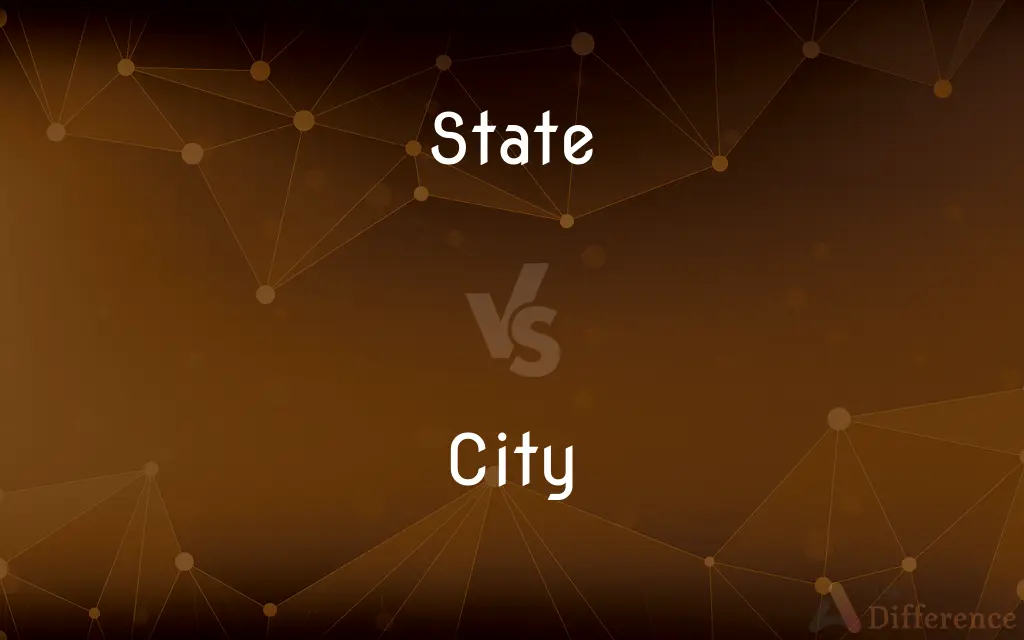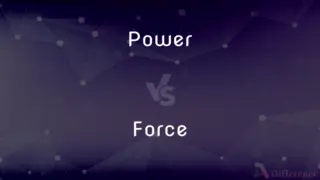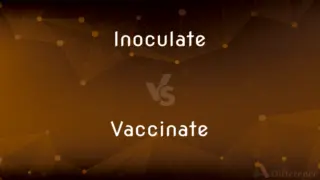State vs. City — What's the Difference?
By Tayyaba Rehman — Updated on October 3, 2023
State: a large governed area within a country. City: a large or significant town that's governed as a municipal unit.

Difference Between State and City
Table of Contents
ADVERTISEMENT
Key Differences
A State usually encompasses extensive geographical areas and possesses its own government with considerable authority. In contrast, a City typically is a large or significant municipality with its own local government and administration.
States, in many countries, have the power to create laws and regulations that are autonomous and sometimes distinct from national laws. On the other hand, Cities generally have to adhere to both the state and national laws, albeit with some localized ordinances and regulations.
Often, a State will contain several cities within its geographical boundaries, overseeing larger infrastructural and legislative matters. A City, conversely, handles more local affairs, focusing on the welfare, regulation, and infrastructure of a more confined area.
In terms of governance, a State is typically led by a governor and has a legislature to make and implement state laws and policies. Meanwhile, a City is commonly governed by a mayor and a city council responsible for local laws and community services.
States usually have a wider range of responsibilities, including managing multiple cities, towns, and sometimes, rural areas within its limits. Cities, however, generally focus on managing and providing services to their urban population and immediate suburban areas.
ADVERTISEMENT
Comparison Chart
Level of Government
Generally has a higher or more broad authority
Localized, operates under both state and national laws
Size
Larger, can encompass multiple cities
Significantly smaller than a state
Leadership
Often led by a governor
Typically led by a mayor
Governance Responsibilities
Encompasses a broad range of matters within its borders
Focuses primarily on localized urban management
Legislative Power
Can often create its own laws
Generally adheres to state and national laws
Compare with Definitions
State
A State is a politically governed region within a country.
Texas is a State known for its large size and distinctive culture.
City
A City often provides numerous services to its residents.
The City opened a new public library downtown.
State
States usually possess significant governmental autonomy.
The State established its own educational curriculum.
City
Cities are usually characterized by dense populations and infrastructure.
The City faced challenges managing heavy traffic.
State
States often have their own set of laws and regulations.
The State enacted a law to protect local wildlife.
City
A City can be distinguished by its cultural, economic, or political importance.
The City was a vital hub for international trade.
State
A condition or mode of being, as with regard to circumstances
The office was in a state of confusion.
City
Cities typically have their own local government and ordinances.
The City implemented a new recycling program.
State
A condition of being in a stage or form, as of structure, growth, or development
The fetal state.
City
A City is a large, significant municipality within a state or country.
The City was bustling with vibrant nightlife.
State
A mental or emotional condition
In a manic state.
City
A city is a large human settlement. It can be defined as a permanent and densely settled place with administratively defined boundaries whose members work primarily on non-agricultural tasks.
State
(Informal) A condition of excitement or distress
Was in a state over going to the prom.
City
A large town
One of Italy's most beautiful cities
The city council
State
Social position or rank.
City
Short for City of London
State
(Physics) The condition of a physical system with regard to phase, form, composition, or structure
Ice is the solid state of water.
City
A center of population, commerce, and culture; a town of significant size and importance.
State
Ceremony; pomp
Foreign leaders dining in state at the White House.
City
An incorporated municipality in the United States with definite boundaries and legal powers set forth in a charter granted by the state.
State
The supreme public power within a sovereign political entity
The state intervening in the economy.
City
A Canadian municipality of high rank, usually determined by population but varying by province.
State
The sphere of supreme civil power within a given polity
Matters of state.
City
A large incorporated town in Great Britain, usually the seat of a bishop, with its title conferred by the Crown.
State
A specific kind of government
The socialist state.
City
The inhabitants of a city considered as a group.
State
A body politic, especially one constituting a nation
The states of Eastern Europe.
City
An ancient Greek city-state.
State
One of the more or less internally autonomous territorial and political units composing a federation under a sovereign government
The 48 contiguous states of the Union.
City
(Slang) Used in combination as an intensive
The playing field was mud city after the big rain.
State
Of or relating to a body politic or to an internally autonomous territorial or political unit constituting a federation under one government
A monarch dealing with state matters.
The department that handles state security.
City
City The financial and commercial center of London. Used with the.
State
Owned and operated by a state
State universities.
City
A large settlement, bigger than a town; sometimes with a specific legal definition, depending on the place.
São Paulo is the largest city in South America.
State
To set forth in words; declare.
City
(UK) A settlement granted special status by royal charter or letters patent; traditionally, a settlement with a cathedral regardless of size.
State
A condition; a set of circumstances applying at any given time.
A state of being
A state of emergency
City
(Australia) The central business district; downtown.
I'm going into the city today to do some shopping.
State
(physics) A complete description of a system, consisting of parameters that determine all properties of the system.
City
(slang) A large amount of something used after the noun.
It’s video game city in here!
State
A mess; disorder.
Absolute state
In a state
City
A large town.
State
(computing) The stable condition of a processor during a particular clock cycle.
In the fetch state, the address of the next instruction is placed on the address bus.
City
A corporate town; in the United States, a town or collective body of inhabitants, incorporated and governed by a mayor and aldermen or a city council consisting of a board of aldermen and a common council; in Great Britain, a town corporate, which is or has been the seat of a bishop, or the capital of his see.
A city is a town incorporated; which is, or has been, the see of a bishop; and though the bishopric has been dissolved, as at Westminster, it yet remaineth a city.
When Gorges constituted York a city, he of course meant it to be the seat of a bishop, for the word city has no other meaning in English law.
State
(computing) The set of all parameters relevant to a computation.
The state here includes a set containing all names seen so far.
City
The collective body of citizens, or inhabitants of a city.
State
(computing) The values of all parameters at some point in a computation.
A debugger can show the state of a program at any breakpoint.
City
Of or pertaining to a city.
State
(sciences) The physical property of matter as solid, liquid, gas or plasma.
City
A large and densely populated urban area; may include several independent administrative districts;
Ancient Troy was a great city
State
(obsolete) Highest and stationary condition, as that of maturity between growth and decline, or as that of crisis between the increase and the abating of a disease; height; acme.
City
An incorporated administrative district established by state charter;
The city raised the tax rate
State
High social standing or circumstance.
City
People living in a large densely populated municipality;
The city voted for Republicans in 1994
State
Pomp, ceremony, or dignity.
In state
The President's body will lie in state at the Capitol.
State
Rank; condition; quality.
State
Condition of prosperity or grandeur; wealthy or prosperous circumstances; social importance.
State
A chair with a canopy above it, often standing on a dais; a seat of dignity; also, the canopy itself.
State
(obsolete) A great person, a dignitary; a lord or prince.
State
(obsolete) Estate, possession.
State
A polity.
State
Any sovereign polity; a national or city-state government.
State
A political division of a federation retaining a notable degree of autonomy, as in the United States, Mexico, Nigeria, or India.
State
(obsolete) A form of government other than a monarchy.
State
(anthropology) A society larger than a tribe. A society large enough to form a state in the sense of a government.
State
An element of the range of the random variables that define a random process.
State
The lexical aspect (aktionsart) of verbs or predicates that do not change over time.
State
(transitive) To declare to be a fact.
He stated that he was willing to help.
State
(transitive) To make known.
State your intentions.
State
(obsolete) Stately.
State
The circumstances or condition of a being or thing at any given time.
State is a term nearly synonymous with "mode," but of a meaning more extensive, and is not exclusively limited to the mutable and contingent.
Declare the past and present state of things.
Keep the state of the question in your eye.
State
Rank; condition; quality; as, the state of honor.
Thy honor, state, and seat is due to me.
State
Condition of prosperity or grandeur; wealthy or prosperous circumstances; social importance.
She instructed him how he should keep state, and yet with a modest sense of his misfortunes.
Can this imperious lord forget to reign,Quit all his state, descend, and serve again?
State
Appearance of grandeur or dignity; pomp.
Where least of state there most of love is shown.
State
A chair with a canopy above it, often standing on a dais; a seat of dignity; also, the canopy itself.
His high throne, . . . under stateOf richest texture spread.
When he went to court, he used to kick away the state, and sit down by his prince cheek by jowl.
State
Estate; possession.
Your state, my lord, again is yours.
State
A person of high rank.
State
The principal persons in a government.
The bold designPleased highly those infernal states.
State
The bodies that constitute the legislature of a country; as, the States-general of Holland.
State
A form of government which is not monarchial, as a republic.
Well monarchies may own religion's name,But states are atheists in their very fame.
State
A political body, or body politic; the whole body of people who are united under one government, whatever may be the form of the government; a nation.
Municipal law is a rule of conduct prescribed by the supreme power in a state.
The Puritans in the reign of Mary, driven from their homes, sought an asylum in Geneva, where they found a state without a king, and a church without a bishop.
State
In the United States, one of the commonwealths, or bodies politic, the people of which make up the body of the nation, and which, under the national constitution, stand in certain specified relations with the national government, and are invested, as commonwealths, with full power in their several spheres over all matters not expressly inhibited.
State
Highest and stationary condition, as that of maturity between growth and decline, or as that of crisis between the increase and the abating of a disease; height; acme.
I do not, brother,Infer as if I thought my sister's stateSecure without all doubt or controversy.
We hoped to enjoy with ease what, in our situation, might be called the luxuries of life.
And, O, what man's condition can be worseThan his whom plenty starves and blessings curse?
State
A statement; also, a document containing a statement.
State
Stately.
State
Belonging to the state, or body politic; public.
State
To set; to settle; to establish.
I myself, though meanest stated,And in court now almost hated.
Who calls the council, states the certain day.
State
To express the particulars of; to set down in detail or in gross; to represent fully in words; to narrate; to recite; as, to state the facts of a case, one's opinion, etc.
State
The group of people comprising the government of a sovereign state;
The state has lowered its income tax
State
The territory occupied by one of the constituent administrative districts of a nation;
His state is in the deep south
State
A politically organized body of people under a single government;
The state has elected a new president
African nations
Students who had come to the nation's capitol
The country's largest manufacturer
An industrialized land
State
The way something is with respect to its main attributes;
The current state of knowledge
His state of health
In a weak financial state
State
The federal department in the UnitedStates that sets and maintains foreign policies;
The Department of State was created in 1789
State
The territory occupied by a nation;
He returned to the land of his birth
He visited several European countries
State
A state of depression or agitation;
He was in such a state you just couldn't reason with him
State
(chemistry) the three traditional states of matter are solids (fixed shape and volume) and liquids (fixed volume and shaped by the container) and gases (filling the container);
The solid state of water is called ice
State
Express in words;
He said that he wanted to marry her
Tell me what is bothering you
State your opinion
State your name
State
Put before;
I submit to you that the accused is guilty
State
Indicate through a symbol, formula, etc.;
Can you express this distance in kilometers?
State
A State can encompass multiple cities and towns.
The State was renowned for its diverse range of cities.
State
A State usually has a governor as a part of its leadership.
The governor of the State proposed a new environmental policy.
Common Curiosities
What defines a State?
A State is a large area with its own government and the authority to pass laws.
Who typically governs a City?
A City is often governed by a mayor and a city council.
What’s an example of a State’s responsibility?
A State might manage highways, larger infrastructure, and state-wide policies.
What is typically larger, a State or a City?
A State is typically larger and can encompass multiple cities.
Do States have their own taxes?
Yes, many States implement their own tax systems separate from national taxes.
Who typically governs a State?
A State is commonly governed by a governor and legislature.
Can a City create its own laws?
Yes, but they usually must adhere to both state and national laws.
Can a State have the same name as a City?
Yes, for example, New York State and New York City.
Does a State only govern urban areas?
No, a State usually governs urban, suburban, and often rural areas.
Can a City be found outside of a State?
Generally, cities are located within a State, but specific structures can vary globally.
What’s an example of a City’s responsibility?
A City might manage local parks, city roads, and local public services.
Do Cities manage international affairs?
No, international affairs are generally managed at a national level, not by cities.
Do all countries have States?
No, the political and administrative divisions vary widely among countries.
Can a City exist without being in a State?
While rare, some cities, like Washington D.C., are not part of any State.
Can States establish their educational systems?
Yes, States often have the authority to establish their own educational standards and systems.
Share Your Discovery

Previous Comparison
Power vs. Force
Next Comparison
Inoculate vs. VaccinateAuthor Spotlight
Written by
Tayyaba RehmanTayyaba Rehman is a distinguished writer, currently serving as a primary contributor to askdifference.com. As a researcher in semantics and etymology, Tayyaba's passion for the complexity of languages and their distinctions has found a perfect home on the platform. Tayyaba delves into the intricacies of language, distinguishing between commonly confused words and phrases, thereby providing clarity for readers worldwide.
















































